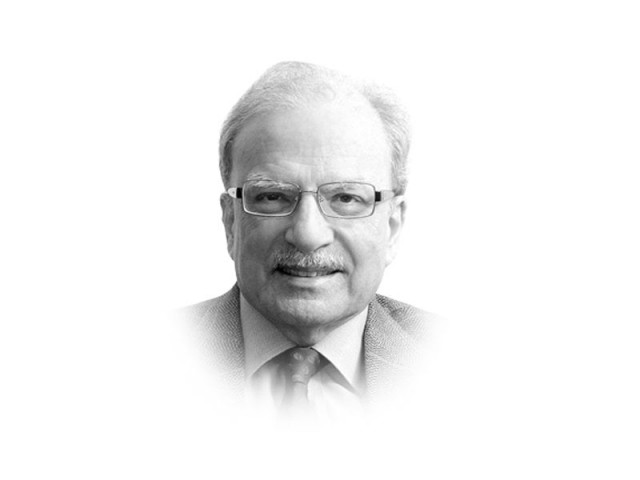The world changed while the PM was out of power
PM must understand what the world has become since the last time he was in power and also the change that will occur.

The writer is a former caretaker finance minister and served as vice-president at the World Bank
From Pakistan’s perspective, perhaps the most significant development is the lack of respect for the country in the western world. Several surveys carried out by western think tanks and agencies rate the country as one of the least liked in the world. The BBC, for instance, surveyed more than 26,000 people around the world to rate their perception of 16 countries and found that Pakistan was seen positively by only 15 per cent of the respondents. Such a low opinion in democracies influences the making of public policy. Pakistan is now in a difficult world in which it has lost respect.
It was a relatively simple world the last time Prime Minister Sharif was in power. It was dominated by one superpower, the United States. Bill Clinton, America’s supremely confident president, governed an equally supremely confident nation. The Soviet Union had collapsed eight years earlier under the weight of its unworkable economic system. In the final year of Nawaz’s second tenure as prime minister, President Clinton had used his enormous influence to negotiate peace between India and Pakistan. The two countries were about to go to war over the failed Kargil adventure undertaken by General (retd) Pervez Musharraf. India had responded with resolve and firmness the general had not expected. The two countries were close to an all-out war when Prime Minister Nawaz Sharif requested President Clinton for help. The American president, sensing the danger in an open conflict between two nations armed with nuclear weapons, worked out a solution that saved Pakistan’s face while Islamabad accepted all the demands made by India. These included total withdrawal from Kargil.
In 1999, Afghanistan seemed more settled than it had been for more than a decade. The Taliban, having overcome the resistance offered to their advance by all but one warlord that had fought the Soviet Union in 1979-89, had brought peace to the country. They ruled the Afghan nation with an iron hand, imposing on it what they believed to be the Islamic way of governance. The regime was recognised by three Muslim countries — Pakistan, Saudi Arabia and the UAE — but was shunned by the rest of the world.
Fourteen years later, in 2013, the third-time prime minister looks at a very different world. Since 1999, the confidence with which Washington dealt with the world is mostly gone. A deep recession in 2007-09 and disagreement in the country about the role of the state have affected the American mood and increased the citizenry’s worry about its future. Since 1999, the United States has been involved in two long wars, both in the Muslim world. It pulled out of Iraq in 2012 and is getting ready to leave Afghanistan. In both countries, a lot of blood was shed and trillions of dollars were spent but what will be left is chaos. These two wars have drained energy out of America and left it weak. Across the Atlantic, the European Union is faced with the deepest economic crisis since its creation. And Japan has been in throes of a recession that has proven to be exceptionally stubborn. As opposed to the old industrial nations, several Asian countries continue to see their economies expand.
China now poses a serious challenge to America’s domination. The most important change from Pakistan’s perspective is the rise of China. It now has the second largest economy in the world, having passed Japan in 2010. It has become the world’s leading exporter; it also surpassed the United States as the world’s biggest trading nation in 2012. India has seen its economy grow at a rate almost three times the average for Pakistan in the last 14 years. Islamabad can no longer look at New Delhi as a near-equal. India has a much larger economy and much stronger military than was the case in 1999. The Muslim world has also changed significantly since the last time Nawaz Sharif occupied the prime minister’s office. The Arab spring of 2011 has felled three long-enduring regimes that had been in power for more than 127 years combined. Regimes changed in Tunisia, Egypt and Yemen as a result of the pressure exerted by the Arab street. There is civil war in the fourth Arab state, Syria. The continuing conflict in Syria threatens to pit the Sunni states against those in which the Shias are in majority. Pakistan, with the world’s second largest Shia population, will have to worry about the possibility of this development.
While Prime Minister Nawaz Sharif has said that solving the country’s energy crisis must be his top priority, he cannot ignore the world outside his country’s borders. He must understand the shape the world has taken since the last time he held the reins of power and also the change that is likely to occur in the future.
Published in The Express Tribune, June 10th, 2013.
Like Opinion & Editorial on Facebook, follow @ETOpEd on Twitter to receive all updates on all our daily pieces.














COMMENTS
Comments are moderated and generally will be posted if they are on-topic and not abusive.
For more information, please see our Comments FAQ